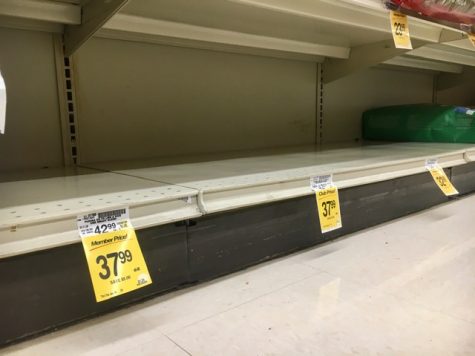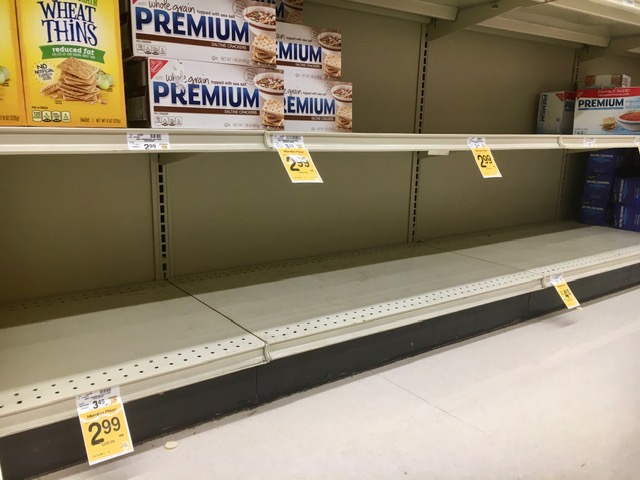Empty Shelves and Missing Products: Why?
COVID-19 impacted so much in the world, one of those things being the supply chain. But what does it mean for the local businesses?
The empty spots on the shelf at the local Safeway, missing the products due to the supply chain disruptions.
No matter what the product is, businesses are selling and people are buying. For many people, shopping is just a normal part of life. They go into the store, buy what they need, and then leave without thinking twice. But lately, products have been missing from shelves or even wiped from stores completely. The supply chain has provided stores and customers with everything they have needed for a long time, but recently it has been facing serious disruptions.
“It’s just an ongoing challenge, so we have to stay one step ahead of it,” Liks Ice Cream Owner, Leslie Thompson said.
Ever since the pandemic hit a little over a year ago, Thompson and her husband have faced many challenges with keeping their small business afloat in the tide of supply chain problems. Right after the first shortages began to hit, Thompson went through her list of 432 flavors and cut about 2/3 of flavors down to a manageable number that she would be able to obtain regularly. Ingredients for many of the ice cream flavors are unreliable, one day the shelves will be completely empty, and the next day they will be packed. For Thompson, ice cream availability isn’t the only problem though. The stock for plastic and paper straws, spoons, cups, and pints can vary. Thompson and her husband have been forced to get creative with their business to help it stay alive in this hard time. Every day, they go shopping for ingredients, in hopes that the shelves have restocked with the items they need. And any deliveries they make could take months to arrive. But Liks Ice Cream is just one of many small businesses facing challenges due to the supply chain disruptions.

“We used to get 96% fill rate on our orders but now we are getting about 52%. We are basically getting about half of what we order,” Ace Hardware Manager Denny Meyers said.
Meyers is unable to obtain a lot of different hardware or it takes a long time to get. Inside Ace Hardware, many of the once filled shelves are empty. Another local business affected by the supply chain disruptions is the small outdoor store called Evergreen Mountain Sports.
“The supply chain issues affect the outdoor industry significantly,” Evergreen Mountain Sports Ski and Bike Manager, Didier Bonnette-Forenz said.
The availability of bike parts and products is low and many outdoor products are very difficult to obtain. Evergreen Mountain Sports mostly receives all the products that they need, but they don’t get them until months later. They are still able to sell things but just not as much as normal. One of the worst parts about the delay though is that the outdoor store isn’t getting the products in time for the seasons when they are used. For example, during the winter there is a high demand for skis, but due to the supply chain disruptions, Evergreen Mountain Sports can’t get as many skis in time for the season.
“Availability has been pushed back over 6 months to a year for many products, but demand is still very high,” Bonnette-Forenz said.
But these three businesses are far from the only ones facing obstacles. Small, local businesses in many small towns including Conifer are seeing the full force of the supply chain disruptions. Some customers are noticing it too. Missing items from shelves, delays on shipping for Christmas presents, and even shortages of certain foods in restaurants. For some businesses, the supply chain issues are devastating. But luckily, many of Conifer’s local businesses are surviving, thanks to the community. After the pandemic hit and threatened small businesses, peoples’ true kindness emerged. For Liks Ice Cream, after the first shortage, it was a panicked scramble because there was a chance that Liks would shut down. But the community united around the small business to keep it going. People were buying pints of ice cream by the dozen and giving generous tips. Some people would even purchase gift cards, and then hand them right back over to the cashier and say, “give it to someone who needs it”. The community showed so much generosity and still continues to do so in these hard times.
“The town rallied around us, and people just came out of the woodwork,” Thompson said.








